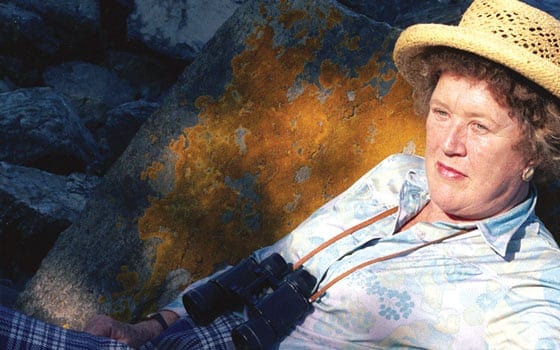
Julia Child ushered the art of French cooking into American homes with her PBS TV series, “The French Chef,” now in endless reruns, and her best-selling book, “Mastering the Art of French Cooking.” She was also an enthralled denizen of post-war Paris and a beloved Cambridge neighbor.
These facets of Child’s life were explored at a symposium last month hosted by the Schlesinger Library at the Radcliffe Institute for Advanced Study, which houses Julia Child’s papers. An endearing display of selected letters and handwritten recipes intertwined with photographs by Paul Child, Julia’s husband, are on view at the library through March 22.
Since her death in 2004, Child’s legacy has been continually parsed and celebrated, spawning books, a vein of scholarship known as “Julia Studies” and the winning 2009 movie, “Julie and Julia,” among many other projects.
The symposium honoring the centenary of Child’s birth offered a day-long sampling of this fervor, drawing an overflow audience as well as Internet viewers. Panels included scholars, authors and local celebrity chefs who reflected on the three realms Child inhabited: Post-World War II Paris, Cambridge, and national television.
In Cambridge, as on TV, Child was disarmingly natural and free of pretension, engaging and curious, whether shopping for cheese or meats or chatting with nearby ladies at her hair salon.
Yet she was an international icon whose Irving Street kitchen, when reassembled at the National Museum of Natural History, quickly became a wildly popular shrine.
The day’s keynote speaker, food journalist Laura Shapiro, considered what made Child such a winning presence. Shapiro pointed out that Child brought a genuine empathy with her audience’s desire to learn the complexities of French cooking, after having diligently struggled to grasp its rigors at the Cordon Bleu in Paris.
Offering perspectives enriched by personal memories were members of Child’s family. Philadelphia Cousins, Child’s willowy look-alike niece, moderated the panel on Child in Paris. Fellow panelists included Alex Prud’homme, a grandnephew of Paul and Julia Child and co-author of “My Life in France.”
Bob Spitz, author of the biography “Dearie: The Remarkable Life of Julia Child,” deftly conjured scenes of the radiant 6-foot-2-inch American woman encountering a depressed Paris populated by 5-foot-6-inch men and “existential girls wearing dirty raincoats.”
Accompanying her husband in his U.S. Information Service diplomatic post in Paris during the American work of reconstruction, Child arrived in 1948, as the period of rations was beginning to end and proper brioche croissants were returning to cafes and bakeries.
The couple landed in the port of LeHavre at dawn. Two hours later, they were in Rouen, where Paul Child guided his wife to a drab bistro for her first meal in France—oysters on the half shell and sole meunière in warm butter accompanied by a lightly chilled Chablis. Their lunch was an epiphany. Child often described it as “the most exciting meal of my life.”
Their next stop was Paris, where Child became an utterly captivated student of French ways, particularly French ways of shopping for and cooking family meals.
Describing his grand aunt as “an eternal pupil,” Prud’homme observed that the word “mastering,” in her cookbook’s title, conveyed the approach of a person who was always learning. At age 90, recalled Prud’homme, Child was eagerly contemplating a ride on a lobster boat in Maine and a visit to a Chicago slaughterhouse.
Yet, said Prud’homme, “France was her north star.” Prud’homme spoke of his granduncle, Child’s husband, as Child’s “hidden collaborator” who encouraged her natural ease during her awkward early forays on camera. “Just think about the food and you’ll be all right,” he counseled his wife.






